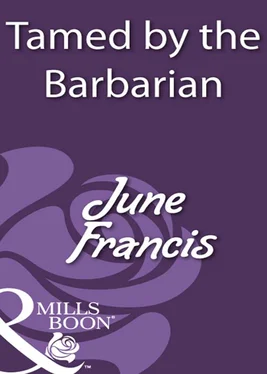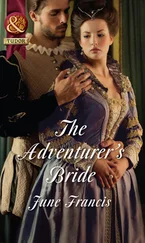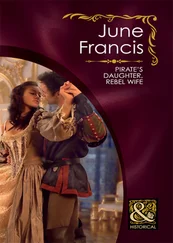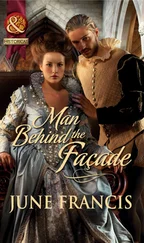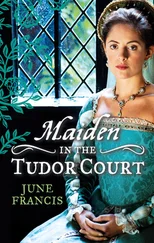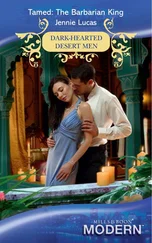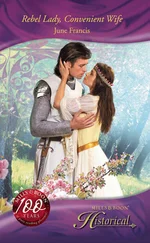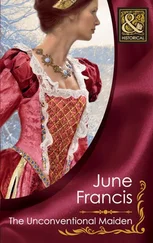She went and placed Mackillin’s dirty clothing in the laundry room. Then she fetched her embroidery and thought to cover her hair with a black veil to complete her mourning attire before settling in front of the fire. She soon realised it was a waste of time trying to work out a way to get news to Diccon while they were snowed in. Instead she allowed her thoughts to drift to what it would be like to travel the seas on Mackillin’s ship and see those places that her father had visited. She regretted deeply that never would she be able to hear his voice describing Venice, Florence, Bruges and all the other cities she would have liked to have seen in his company; but she sensed that his lordship had her father’s gift for painting pictures with words.
Mackillin was thoughtful as he rubbed himself vigorously with the drying cloth. His skin glowed and a wry smile creased his face. At least Mistress Cicely should be satisfied that he no longer stank of honest sweat and horse. Had it been she who had thrown the soap? He had glimpsed a whisk of a black skirt vanishing when he opened his eyes and his soiled garments had disappeared. Hopefully she had not seen enough of him to frighten her away. He smiled wryly, remembering on his travels how pleasant it had been to have a wench wash his back and generally make herself useful. Vividly, a picture came into his mind of Cicely behaving in a similar fashion and he imagined the soft swell of her breasts beneath silk brushing his bare shoulder. Desire rushed through him and he shook his head as if to rid himself of such longings. She was not for him, whatever Nat Milburn had promised.
He must concentrate his thoughts on his intended bride. From what he remembered of her from their last meeting, Mary was as different in appearance to Cicely Milburn as could be, but then she had only been a child and would surely have improved. She had dark hair, not the colour of corn like Mistress Cicely. He had never felt it, but doubted it would be as silky as Jack’s sister’s was when he had seized a handful of it while he had kissed her. Hell and damnation, he must stop thinking of her! Marrying Mary Armstrong would provide him with all he needed. She was sturdy and strong and no doubt could produce healthy sons and pretty daughters. His elder half-brother had wed and sired children, but no offspring had lived beyond infancy. As for the younger one, Fergus, his wife had died in childbirth last year and the baby with her, poor lass.
His lips tightened as he relived Fergus’s teasing and bullying, the challenges and hard-fought tussles on the battlements of their grandfather’s castle in the south-west of Scotland and his father’s keep in the Border country. The scar beneath his collarbone throbbed as if experiencing afresh the plunge of Fergus’s blade. Mackillin would never forget the hatred in his eyes for the son of the English woman who had replaced their mother. Now the three men were dead, killed in an ambush. His mother did not seem to know who was responsible. Due to his half-brothers leaving no heirs, Mackillin had inherited Killin Keep and its lands.
He was reminded again of Cicely, wondering if she would change her mind about his being a barbarian if she knew he was half-English. At least his altered appearance might convince her that he was no savage. He ran a hand over his freshly shaven jaw as he strolled into the bedchamber with the drying cloth slung about his lean hips.
Mackillin reached for his drawers and hose and pulled them on. He then put on a petticote beneath a linen shirt and donned a green woollen doublet, embroidered at neck, cuffs and hem. Over this he pulled on a sleeveless brown velvet surcoat that reached to his hose-covered calves before placing a vellum-backed book inside a concealed pocket. He combed his hair, which had been cut to just below his ears. Now he felt fit to be in a woman’s company.
Thinking of Cicely again brought a lift to his heart, but a frown to his face as he slipped on a pair of leather shoes that laced up the sides. He took the lantern from the table and left the bedchamber, locking the door behind him. He placed the key in his pocket and strolled down the passage. As he went downstairs, he spotted Cicely sitting by the fire and scowled. She had covered her hair with a black veil; with her black gown and surcoat, this gave her a nun-like appearance. Was it deliberate? Was she saying, Do not touch?
As he approached, the dogs lifted their heads and she glanced up from her sewing. He saw her eyes widen and knew he had achieved the effect he had aimed for. His mood lightened. She half rose in her chair, but he told her not to disturb herself, so she resumed her seat and bent her head over her embroidery.
Mackillin settled himself in a chair close to the fire and took out his book. It was one that an elderly Percy relative had left him in his will and was over fifty years old. Fortunately the handwriting was still legible. As he carefully turned the pages, he was aware that Cicely was watching him.
‘Whenever I take up this book, I think of the copyist working for months on end, writing out thousands of words,’ he said.
‘What book is it?’ asked Cicely, impressed not only by his appearance but that he should produce a book and to all purposes seem intent on reading it. She was relieved that he appeared to have no idea that she had seen him in his skin and yet felt vexed with herself for wanting to touch his shaven cheek and run her fingers through the chestnut hair that curled about his ears. What would her father have thought of her for having such desires? How could she be grieving for him, be in love with Diccon and yet still be attracted to this man?
‘The Canterbury Tales—have you heard of it?’ asked Mackillin.
‘Aye. But I’ve never seen a copy before.’ She was surprised that her voice sounded normal.
‘Perhaps you’d like me to read some to you?’ He had found the place where he had left off and, without waiting for her answer, added, ‘This is part of “The Monk’s Tale”, a piece written about Count Ugolino of Pisa.’
‘Who was this Count, my lord?’
‘Mackillin,’ he said automatically, reading in silence for a few moments before lifting his head and grimacing. ‘Perhaps not.’
‘Why—why not?’ She stared at him and their eyes met and held for several quickened heartbeats.
‘Because it is a tragedy and you have enough sadness to deal with at the moment,’ he said brusquely, lowering his gaze and turning pages. ‘“The Miller’s Tale” is amusing and brings tears to the eyes, but it is not suitable for a maid’s ears. Perhaps “The Second Nun’s Tale” would be best. There’s an “Invocation to Mary”, daughter and mother of our Saviour in its pages.’
‘Daughter and mother?’
‘Aye, such is what the writer has written here…maid and mother, daughter of thy son.’
‘I have never thought of our Lady being both daughter and mother to our Saviour before….’ She stumbled over the words, but added, ‘Of course, if He is part of the Trinity—Father, Son and Holy Ghost, three in one—then it must be so. And yet…’
‘It is a mystery, I agree. Do you wish me to read on? Or would you rather I read…what have we here?’ He smiled. ‘An “Interpretatio Nominis Ceciliae”. Did you know that the name Cecilia in the English tongue means Lily of Heaven?’
‘Aye! My father told me so. Cecilia was a highborn Roman woman and my name derives from hers.’ Cicely was amazed that they were having such a conversation and not only because she was reneging on her decision to distance herself from him.
‘You know her story?’
She nodded, filling in a flower petal with blue thread and thinking of the Cecilia who had converted her pagan husband to Christianity. ‘If you have not read it before, then I do not mind hearing it again,’ she murmured.
Читать дальше
